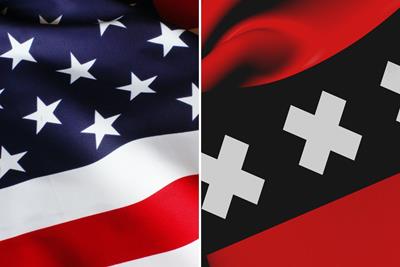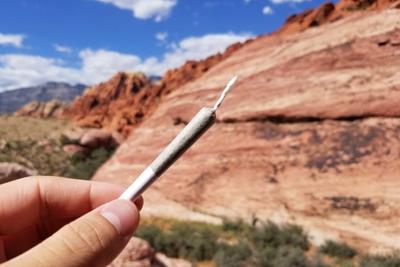
Wednesday December 29, 2021
By Erin Hiatt
 Travel
Travel
Cannabis legalization has proceeded in patchwork fashion, with each state setting out their own unique laws and regulations. However, one totally non-patchwork issue is that to purchase cannabis – whether recreational or medical – you'll need a current and valid ID. But what type of ID does each state accept at dispensaries?
It's a basic rule of thumb that the ID has to be current, and show your birthdate and photo. However, it's important to remember that each state has their own rules and regulations, and whether or not your ID will pass muster – especially if you've only recently turned 21 and are hoping to make your first recreational purchases – could be up to whoever is checking it.
If you're in doubt whether or not a dispensary will accept your ID, always call ahead. Forewarned is forearmed, so we have put together this guide so you'll know just what kind of ID is accepted at dispensaries from state-to-state, especially pertinent for adult-use consumers who may not be aware of local laws, or medical marijuana patients traveling away from their home state.
***This article details ID policies as defined by a state's legal framework. Please note that dispensaries still reserve the right to implement their own ID policies and add even more restrictions to protect their business from fraud (i.e. not accepting vertical IDs, special requirements for out-of-state IDs, etc.) Again, it is always recommended to call ahead to your dispensary before visiting if you have concerns about your ID.***
Types of ID Accepted at Dispensaries Across the Unitec States
Below, you will find a breakdown of every state's ID policy when it comes to medical or recreational cannabis.
Alaska
ADULT-USE: U.S. ID card, state-issued driver's license, or passport.
MEDICAL: Valid, state-issued medical marijuana card and current ID showing residency.
Arizona
ADULT-USE: U.S. ID card, state-issued driver's license, or passport.
MEDICAL: Valid, state-issued medical marijuana card and current ID showing residency. Dispensaries in Arizona will serve "visiting qualifying patients" from out-of-state if they meet certain criteria.
Arkansas
MEDICAL: Valid, state-issued medical marijuana card and current ID showing residency. Arkansas does allow residents from out-of-state to purchase medical marijuana if they can show registration in another legal medical marijuana state, provided they fill out a visiting patient form.
California
ADULT-USE: U.S. ID card, state-issued driver's license, or passport.
MEDICAL: Valid, state-issued medical marijuana card and current ID showing residency.
Colorado
ADULT-USE: U.S. ID card, state-issued driver's license, or passport, valid ID from many U.S. territories, including American Samoa and Puerto Rico, federally recognized tribal cards, and military ID cards.
MEDICAL: Valid, state-issued medical marijuana card and current ID showing residency.
Connecticut
ADULT-USE: As of July 2021, cannabis is legal in the Nutmeg State, but cannabis retail is not expected to be up and running until sometime in 2022. Expect to provide a U.S. ID card, state-issued driver's license, or passport.
MEDICAL: Valid, state-issued medical marijuana card and current ID showing residency.
Delaware
MEDICAL: Valid, state-issued medical marijuana card and current ID showing residency.
Florida
MEDICAL: Valid, state-issued medical marijuana card and current ID showing residency.
Hawaii
MEDICAL: Valid, state-issued medical marijuana card and current ID showing residency. The Aloha State does allow medical marijuana reciprocity. To participate in the program, patients or caregivers may apply up to 60 days prior to intended use, and pay a $49.50 fee.
Illinois
ADULT-USE: U.S. ID card, state-issued driver's license, or passport.
MEDICAL: Valid, state-issued medical marijuana card and current ID showing residency.
Louisiana
MEDICAL: Valid, state-issued medical marijuana card and current ID showing residency.
Maine
ADULT-USE: U.S. ID card, state-issued driver's license, or passport
MEDICAL: Valid, state-issued medical marijuana card and current ID showing residency. Maine allows reciprocity for some out-of-state patients, provided they have a valid medical marijuana certification from their home state, a valid ID from the state that issued the certification.
Maryland
MEDICAL: Valid, state-issued medical marijuana card and current ID showing residency.
Massachusetts
ADULT-USE: U.S. ID card, state-issued driver's license, or passport, instruction permits, MA temporary driver's license, U.S. Armed Forces and Merchant Marine ID cards, MA liquor cards, and ID card issued from any Canadian province.
MEDICAL: Valid, state-issued medical marijuana card and current ID showing residency.
Michigan
ADULT-USE: U.S. ID card, state-issued driver's license, or passport.
MEDICAL: Valid, state-issued medical marijuana card and current ID showing residency. If you are an out-of-state medical marijuana patient, it is up to the individual dispensary to decide whether they'll serve you. Call ahead.
Minnesota
MEDICAL: Valid, state-issued medical marijuana card and current ID showing residency.
Missouri
MEDICAL: Valid, state-issued medical marijuana card and current ID showing residency.
Montana
ADULT-USE: As of January 1, 2021, cannabis is legal in Montana, but cannabis retail is not expected to be up and running until sometime early 2022. Expect to provide a U.S. ID card, state-issued driver's license, or passport.
MEDICAL: Valid, state-issued medical marijuana card and current ID showing residency.
Nevada
ADULT-USE: U.S. ID card, state-issued driver's license, or passport.
MEDICAL: State-issued medical marijuana card and current ID showing residency. Nevada will serve medical marijuana patients with valid cards from other medical marijuana states if 1) the cardholder signs an affidavit that he/she/they are entitled to engage in the medical use of marijuana their state of jurisdiction or residence, and 2) they abide by the legal limits of cannabis possession in Nevada; 2 ½ ounces per 14 days.
New Hampshire
MEDICAL: Valid, state-issued medical marijuana card and current ID showing residency.
New Jersey
ADULT-USE: In February 2021, Governor Phil Murphy signed the law making weed legal in the Garden State. However, consumers will have to wait a bit longer to make legal purchases while the retail infrastructure takes shape. Expect to provide a U.S. ID card, state-issued driver's license, or passport.
MEDICAL: Valid, state-issued medical marijuana card and current ID showing residency. New Jersey does recognize medical marijuana cards from out of state for up to six months, and can be certified by qualified New Jersey doctors.
New Mexico
ADULT-USE: The Cannabis Regulation Act took effect at the end of June in 2021, but lawmakers are still laying the groundwork for a legal retail market, expected to roll out around April, 2022. Expect to provide a U.S. ID card, state-issued driver's license, or passport.
MEDICAL: Valid, state-issued medical marijuana card and current ID showing residency.
New York
ADULT-USE: On March 31, 2021, New Yorkers can possess and consume marijuana. Policymakers are still working on rolling out the regulated retail market, with estimates for opening running from eighteen months to two years. Expect to provide a U.S. ID card, state-issued driver's license, or passport.
MEDICAL: Valid, state-issued medical marijuana card and current ID showing residency.
North Dakota
MEDICAL: Valid, state-issued medical marijuana card and current ID showing residency.
Ohio
MEDICAL: Valid, state-issued medical marijuana card and current ID showing residency.
Oklahoma
MEDICAL: Valid, state-issued medical marijuana card and current ID showing residency. Registered medical marijuana patients from other states are allowed to purchase and consume cannabis in OK, but must apply for a temporary license and pay a $100 fee that must be renewed every 30 days.
Oregon
ADULT-USE: U.S. ID card, state-issued driver's license, or passport, valid ID from any U.S. territory, an ID from a federally recognized Indian tribe showing name, photo, and date of birth, unexpired military ID cards, or current NEXUS or SENTRI card.
MEDICAL: Valid, state-issued medical marijuana card and current ID showing residency.
Pennsylvania
MEDICAL: Valid, state-issued medical marijuana card and current ID showing residency.
Rhode Island
MEDICAL: Valid, state-issued medical marijuana card and current ID showing residency. Rhode Island will accept medical marijuana cards from other states but must show a government-issued ID from the state that certified the medical marijuana card.
Utah
MEDICAL: Valid, state-issued medical marijuana card and current ID showing residency. Utah dispensaries will serve out-of-state residents with a Utah qualifying condition if they register with the Utah Department of Health for a Non-Utah resident card. Non-residents may request a card for up to two 21-day periods in a calendar year.
Vermont
ADULT-USE: Cannabis is legal in the Green Mountain State for adults 21 and over, but retail establishments are not expected to open until 2022. In the meanwhile, Vermonters are allowed to grow their own.
MEDICAL: Valid, state-issued medical marijuana card and current ID showing residency.
Virginia
ADULT-USE: Since July 2021, it has been legal for Virginians to consume, possess, and even grow up to four marijuana plants. However, like other newly-legal states, the retail market has yet to emerge. Expect 18 months to two two years before retail sales begin.
MEDICAL: Valid, state-issued medical marijuana card and current ID showing residency.
Washington
ADULT-USE: U.S. ID card, state-issued driver's license, or passport.
MEDICAL: Valid, state-issued medical marijuana card and current ID showing residency. Washington has been on a bit of a medical marijuana seesaw in recent years, but today patients, including minors, may certify to enroll in the state's medical marijuana database.
Washington D.C
ADULT-USE: The District of Columbia does not have retail stores, but instead operates on a "grow and give" model, where adult consumers of age can grow their own and share with adult friends at no cost. Dispensaries have figured out a clever workaround, however, where the purchase of a t-shirt or other swag may also result in the "gift" of weed in your checkout bag.
MEDICAL: Valid medical marijuana card issued from the District of Columbia, and current ID showing residency. D.C. is another locality that will honor medical marijuana cards from other states with an equally functioning medical marijuana program.
West Virginia
MEDICAL: Valid, state-issued medical marijuana card and ID showing residency.
Conclusion
If you're over 21, it's safe to assume that a state-issued ID or Driver's License in good standing will get you in the door at most dispensaries. Some states or dispensaries may take issue with "vertical" ID's (issued to people under 21, though they may become of age while still holding the alternate ID style). If your ID is horizontal and valid, the standard options tend to have no issues). For other forms of ID, including passports and temporary ID's you may want to call and double check before your visit.
Do you have any questions about what forms of IDs are accepted at dispensaries? Share them in the comments below.










